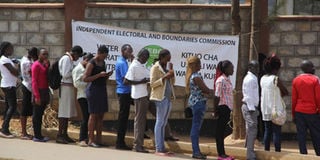Angry voters await MPs in August poll

Wananchi queue to register as voters at Kenya Medical Training College in Eldoret, Uasin Gishu County, last week. PHOTO | JARED NYATAYA | NATION MEDIA GROUP
What you need to know:
- About 42 per cent of the sitting MP is “not likely” to be re-elected.
- Voters are most unhappy in Jubilee strongholds with 46 per cent of Jubilee supporters saying they didn’t think their MPs will make it back.
- MPs from Nasa leaning areas can afford a small sigh of relief — 43 per cent of their voters think they will be re-elected.
- In central Kenya, voters are steaming with fury — a full 60 per cent do not expect their MPs to come back.
- At the Coast, the possibility of re-election and of being voted out is equal at 33 per cent, with 34 per cent not sure.
Almost half of MPs will be looking for a job in September, victims of voter fury, according to a new poll.
The situation is worse in Jubilee areas, where dissatisfaction is at its highest. And defectors had better prepare for the worst because voters believe they quit their parties in pursuit of selfish interests.
In a survey of 2,057 Kenyans between January 9 and 26, the polling company Ipsos Kenya, reported that 42 per cent of those polled said the sitting MP is “not likely” to be re-elected, 39 per cent opined that it was “very likely” that their MPs will be re-elected while 19 per cent were not sure.
SMALL SIGH
Voters are most unhappy in Jubilee strongholds with 46 per cent of Jubilee supporters saying they didn’t think their MPs will make it back, 39 per cent saying they will and 15 per cent not sure.
On the other political neck of the woods, MPs from Nasa leaning areas can afford a small sigh of relief — 43 per cent of their voters think they will be re-elected, 37 per cent think the legislators will be booted out and 19 per cent are not sure.
It is a very bad time to be a n MP in central Kenya where voters are steaming with fury — a full 60 per cent do not expect their MPs to come back.
Central Kenya is closely followed by North Eastern in the league of dissatisfaction, with half of respondents saying their MPs will not make it back, then Rift Valley (45 per cent), Western (44 per cent), Eastern (37 per cent), Nairobi (32 per cent), and Nyanza (31 per cent).
EQUAL CHANCE
At the Coast, the possibility of re-election and of being voted out is equal at 33 per cent, with 34 per cent not sure.
The study asked respondents about their knowledge of their MPs, their re-election chances, and whether change of political affiliation was a blessing or a political curse.
The findings are part of Ipsos’ most recent national household survey and also sought to gauge the re-election chances of opposition leaders who recently defected to Jubilee. In September 2016, the Jubilee team engineered the exit of at least 40 leaders — Governors Salim Mvurya (Kwale), Simon Kachapin (West Pokot), Kisii Deputy Governor Joash Maangi and at least 35 MPs — to the ruling team in what they hoped would shore up their numbers in the House and in the August ballot.
MPS FACE PUNISHMENT
While others have moved from Jubilee to Nasa, the study only sought to find out the likely fate of those that moved to the ruling party.
And, as the study found out, it seems that punishment for disloyalty awaits them at the ballot: 58 per cent of respondents said those who defected to Jubilee or moved closer to it from Nasa will not see the inside of the House in August, while 56 per cent of opposition supporters said those who remained steadfast in Nasa are likely to be re-elected. Of those that defected to Jubilee, only 25 per cent of respondents said they are very likely to be re-elected, the study found.
Two in five Kenyans (44 per cent) said they thought the leaders changed parties because of personal benefit and greed.
At least 26 per cent said that they thought the MPs defected to promote development, four per cent said it was to increase chances of re-election while only one per cent said it was because of disunity within the opposition.
And in the stark contrast and right-down-the-middle divide that is Kenya’s politics, 57 per cent of the Jubilee supporters said the MPs moved to promote development, an almost equal number (59 per cent) in Nasa say they moved for their own personal benefit and greed.
MPS KNOWN
At least 80 per cent of Kenyans know their MP by name, with 97 per cent of them in North Eastern able to mention them by name.
The knowledge is worst at the Coast (58 per cent), Western (92), Nyanza (90), Eastern (86), Rift Valley (79), Central (76), and Nairobi (60 per cent).
In 2007, 63 per cent of the sitting MPs lost their seats with the biggest casualties being then Vice President Moody Awori, and ministers Mutahi Kagwe, Paul Sang, Musikari Kombo and Moses Akaranga.
In 2013, then ministers Sam Ongeri, Chirau Ali Mwakwere, Charity Ngilu, Najib Balala, and Henry Kosgei were not elected in the seats they sought.
An analysis of the last five elections in the country shows that sitting MPs’ chances of being re-elected is between 30 and 40 per cent, with the highest casualties in Central Kenya.




